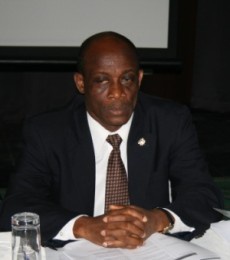...as talks are set to begin on 2014 wages
Finance Minister Seth Terkper has signalled that government may not yield to the expected sharp rise in public sector salary demands triggered by the high increases in household utility and transport costs.
He said labour must balance both past and present factors when wage talks begin shortly. In a significant break with the past, government and the Trades Union Congress (TUC) have resolved to conclude negotiations for 2014 wages before November’s budget reading -- a move that will improve budgeting for wage spending, which is often a cause of fiscal shocks.
The talks will lead to a new minimum wage and agreement on the level of pay increase for 2014.
Labour is expected to up its pay demands due to a rise in the cost of living after electricity tariffs were raised by 78.9 percent and water tariffs by 52 percent from October. Transport prices were also boosted by 20 percent last month.
Mr. Terkper however said in an interview with the B&FT that having benefitted from pay hikes during the last two years, when the cost of living was more stable, labour must moderate its demands.
“When utility prices were not going up for more than one year, we were still increasing wages. So why the linkage now?” he said, adding: “for two years running there were wage increases under the Single Spine, but utility prices were not increased, and neither were fuel prices all through last year. Yet there was no linkage.”
Asked whether government has set a ceiling for pay increases in 2014, Mr. Terkper, who has described the trajectory of wage growth as unsustainable, said: “Wage negotiations are a tripartite activity, so it would be presumptuous for government to do that. The tripartite committee has just being convened for 2014, and a lot is going to change as far as wage negotiations are concerned.”
He added: “We’ve consistently maintained that the wages are too high. We are introducing ‘budgetary constraint’ as an element in negotiating wages.”
In April and June, the International Monetary Fund (IMF) urged government to “gain control over the wage bill” and conduct a thorough audit of the public sector pay-roll. Estimates are that there are about half-a-million workers on the pay-roll, but this number is believed to include a lot of fictitious or “ghost” workers.
Government capped salary increases this year at 10 percent, the lowest rise since 2010, in its effort to rein-in the cost of wages, estimated at 72 percent of tax revenue in 2012. The cap was also intended to help government meet its target of cutting the budget deficit to 9 percent of GDP this year, from a peak of 11.8 percent in 2012.
Kofi Asamoah, Secretary-General of the TUC, said in an interview on September 6 that wage negotiations for 2014 will be based on the projected inflation for next year and the general cost of living.
Mr. Terkper has said government’s target is to cut the cost of the wage bill to 35 percent of tax revenue -- which is consistent with the ceiling set by the West African Monetary Zone (WAMZ), the group of six regional economies, including Ghana, which plan to have a common currency by 2015.
Business News of Thursday, 3 October 2013
Source: B&FT
Terkper asks labour to balance demands

















